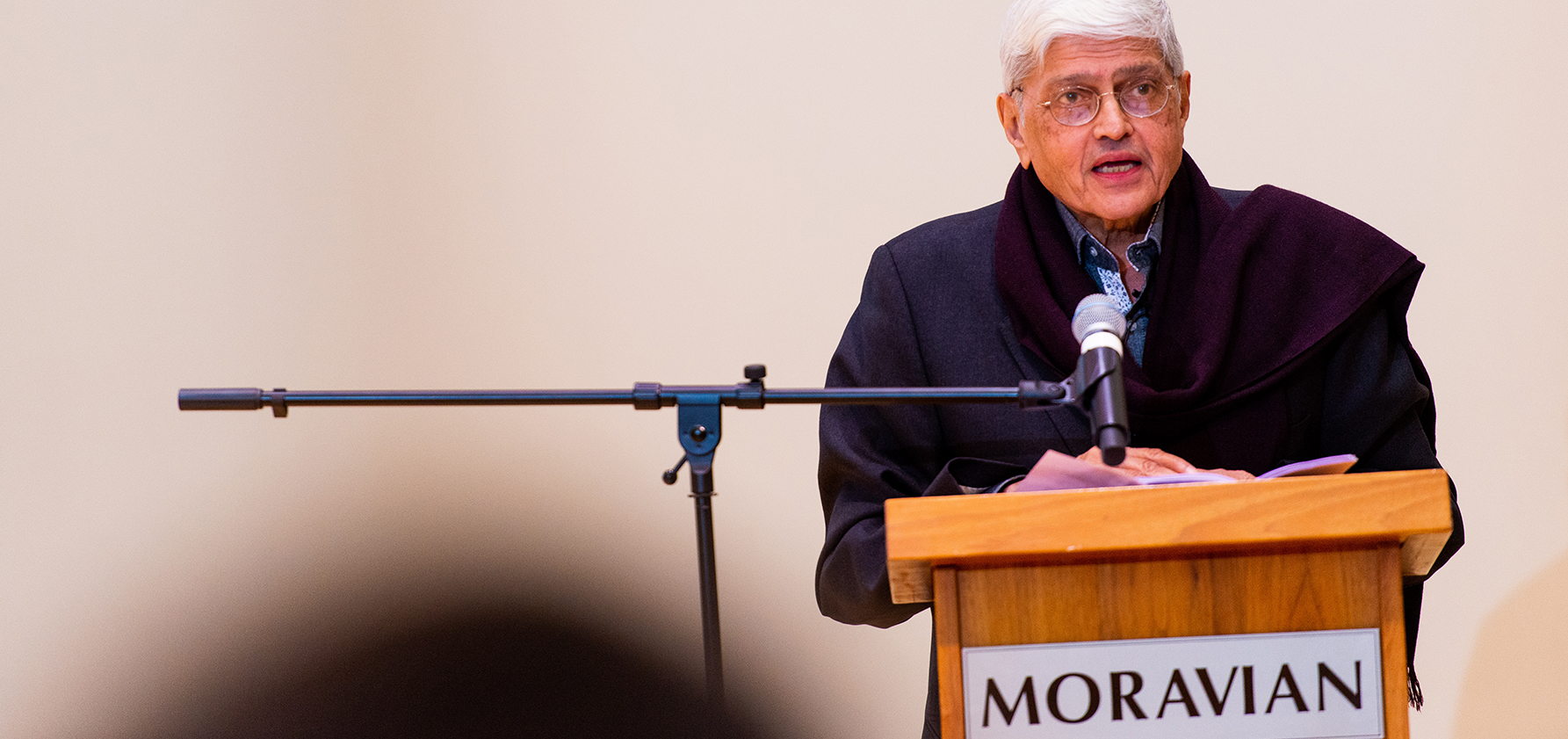
On Tuesday, April 2, 2019, Gopalkrishna Gandhi, the grandson of Mahatma Gandhi, came to Moravian College to give a presentation, the second lecture of the annual Rabindranath Tagore Distinguished Lecture Series. He took time out of his day to speak with the students in Economics Professor James West’s class Current Topics in Finance. Here, two students share their reflections on Gandhi’s visit.
What Will Your Life Be?
By Kyle Upton ’19
Just like his grandfather, Gopalkrishna Gandhi is an extremely humble man. Reflecting on his illustrious career, he was sure to note that a title, while sounding important, does not mean everything. He said the best and most significant title he has ever had is “Grandfather”; he sincerely enjoys being a grandfather and is very grateful for his grandchildren. Gandhi stressed the importance of enjoying the intangible and small pleasures in life, and emphasized that doing so does not mean you cannot achieve great things on a large scale. You can effect change, but it starts small, and within ourselves, whether local or widespread change.
India has a very long and rich history, and the past century has been no different. Calling upon times from the past, Gandhi illustrated the immense change that India has experienced in contemporary history. But while many advancements and innovations have been realized, inherent problems hinder the full development of India. Young people are moving from rural areas and outskirts, to urban areas with more offerings. After explaining how the young people in India want so badly to come to America but do not have the means, he described this feeling amongst the nation’s youth as “unfulfilled aspiration.” It puts in perspective all that we have to be thankful for.
With that, he spoke to the importance of thinking intergenerationally, thinking of those who have come before us and those who will come after us. How will we appreciate our predecessors and what they have done? He asked us to imagine ourselves 50 years from now. What kind of family will we have raised by then? What contribution to society might we cite? What fulfillment will we have achieved from life? In parting with this, Gandhi encourages us to consider these questions as we go about life, to enhance not only ourselves but also those around us and those who will someday be where we are.
Climate Change and Culture
By Brian Darling ’20
As part of his discussion with our class the class, Gandhi delved into the economics of the water crisis that India is currently experiencing as a result of severe drought spanning several months. He explained that while the crisis hasn’t reached the point of no return, it is serious enough that for people who cannot buy bottled water, finding water is a daily struggle. He spoke about how younger generations are becoming more environmentally conscious and concerned, and he has hope that their efforts can reverse the trends in climate change and lead to recovery of India’s environment.
The class began to look at climate change from a different perspective. In the United States, most of us are not seriously impacted in our everyday lives by the effects of global warming, but in India and other countries, just finding water to drink can be a significant challenge for many. Access to water is very much affected by class and social status. “The rich enjoy swimming pools and the poor collect droplets from the taps,” Gandhi said.
Many of us who live comfortably don’t think about the daily struggle of others. We don’t give a second thought to the necessities of everyday life that people in countries like India have to think about from the second they wake up. As economists, we would be wise to focus not only on how to increase wealth but how take a more humanitarian view and help make all lives better. Together we can accomplish tremendous good!